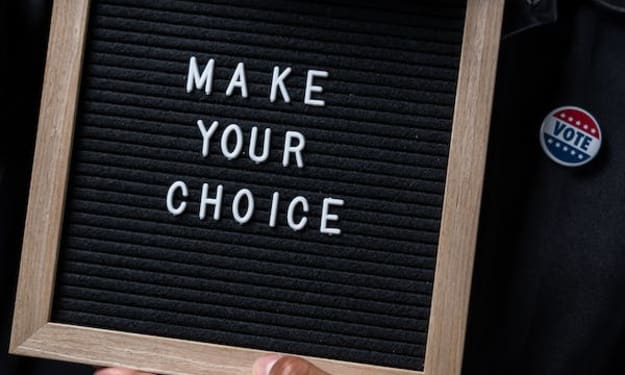A Peaceful Path to Change
The Power of Referendum

Introduction:
In a world that has often witnessed conflicts and divisions over contentious issues, the concept of a referendum provides a beacon of hope. It offers a peaceful and democratic avenue for societies to express their collective will and make decisions without resorting to violence or war. In this blog post, we explore the significance of referendums as a means of resolving disputes, promoting dialogue, and fostering unity, all while avoiding the devastating consequences of armed conflict.
The Essence of Referendum:
Referendums are democratic processes that allow citizens to directly vote on a specific issue or decision that affects their society. It is an opportunity for people to have a say in matters of national or regional importance, thereby ensuring that decisions are made with the consent and participation of the population.
Resolving Divisive Issues:
Referendums provide a peaceful way to address contentious issues that have the potential to create social or political divisions. By allowing citizens to express their opinions through a democratic vote, referendums offer a platform for open dialogue, enabling diverse perspectives to be heard and considered.
Promoting Inclusive Decision-Making:
Referendums allow decision-making to extend beyond political elites or representatives. They empower individuals and communities to actively participate in shaping the future of their nation or region. This inclusivity strengthens the democratic process, promotes civic engagement, and fosters a sense of ownership and responsibility among citizens.
Enhancing Trust and Legitimacy:
Referendums can enhance public trust and confidence in the decision-making process. When people have the opportunity to vote on important issues, it increases transparency and accountability. Referendums also help legitimize decisions by ensuring that they reflect the will of the majority and provide a clear mandate for action.
Fostering Peaceful Transitions:
Referendums have played a pivotal role in peaceful transitions, especially in regions affected by conflicts or disputes. By allowing citizens to decide on matters such as territorial disputes, self-determination, or constitutional reforms, referendums provide a nonviolent mechanism for resolving complex issues and building a foundation for lasting peace.
International Recognition and Support:
Referendums conducted in accordance with democratic principles and international norms often gain recognition and support from the international community. When conducted transparently and with integrity, referendums can strengthen a nation's standing on the global stage, fostering diplomatic relations and facilitating peaceful dialogue between nations.
Lessons from Successful Referendums:
Examining successful referendums, such as the Scottish Independence Referendum or the Good Friday Agreement in Northern Ireland, offers valuable insights into the positive outcomes that can be achieved through peaceful democratic processes. These examples highlight the importance of inclusive dialogue, clear communication, and respectful engagement with diverse perspectives.
In the context of referendums without war, both governments and individuals have crucial roles to play in ensuring a peaceful and successful process:
Government Role:
- Promoting Dialogue and Understanding: Governments should foster an environment of open dialogue and understanding, encouraging diverse perspectives to be heard and respected. This includes facilitating public debates, providing accurate information about the issue at hand, and promoting an atmosphere of tolerance and respect.
- Ensuring Transparency and Fairness: Governments have the responsibility to ensure transparency and fairness throughout the referendum process. This involves establishing clear rules and procedures, safeguarding the integrity of the voting process, and addressing any concerns or irregularities that may arise.
- Protecting Human Rights and Rule of Law: Governments must uphold human rights principles and the rule of law during referendums. They should ensure that individuals are free to express their opinions without fear of reprisal and that fundamental rights, such as freedom of speech and assembly, are protected.
- Implementing Results: Once the referendum has taken place and a decision has been reached, governments must respect the outcome and take appropriate actions to implement the results in a transparent and responsible manner. This includes engaging in constructive dialogue with relevant stakeholders and ensuring that the will of the people is translated into effective policies and actions.
Individual Role:
- Active Participation: Individuals should actively engage in the referendum process by educating themselves about the issue at hand, attending public debates or discussions, and exercising their right to vote. Each individual's participation contributes to the legitimacy and representativeness of the referendum.
- Respectful Engagement: It is essential for individuals to engage in respectful and constructive dialogue with others, even when opinions differ. By fostering a culture of respectful engagement, individuals can contribute to a peaceful and inclusive referendum process, where diverse perspectives are valued and considered.
- Promoting Peaceful Discourse: Individuals have the power to promote peaceful discourse and discourage the spread of misinformation or hate speech. By promoting understanding, empathy, and respectful communication, individuals can create an environment conducive to finding common ground and reaching a consensus.
- Respecting the Outcome: Regardless of personal opinions or preferences, individuals should respect the outcome of the referendum. This includes accepting the decision reached by the majority and working towards unity and cooperation in the aftermath of the vote.
- Holding Government Accountable: Individuals have a role in holding their governments accountable throughout the referendum process. This involves monitoring the transparency and fairness of the process, raising concerns or irregularities if they arise, and actively participating in discussions and debates to ensure their voices are heard.
Conclusion:
Referendums provide a powerful alternative to conflict and war, enabling societies to address contentious issues peacefully, democratically, and inclusively. By embracing referendums as a means of decision-making, societies can foster unity, promote dialogue, and build a foundation for sustainable peace. Let us recognize the potential of referendums as transformative tools that shape the destiny of nations, ensuring that the voices of citizens are heard and respected without resorting to violence or armed conflict.
About the Creator
FELIX Olikagu
Captivating storyteller and compassionate wordsmith. Join me on a journey through the power of words, as we explore diverse topics with depth, creativity as it concerns Health issues, Environment, Emotions, and a touch of magic. Explore!






Comments
There are no comments for this story
Be the first to respond and start the conversation.